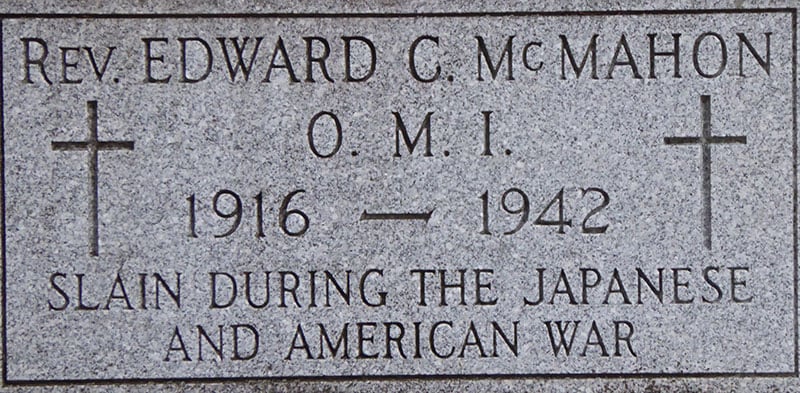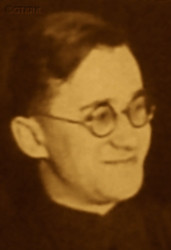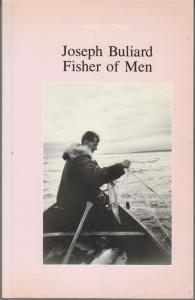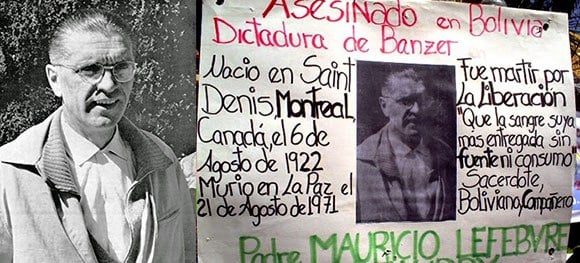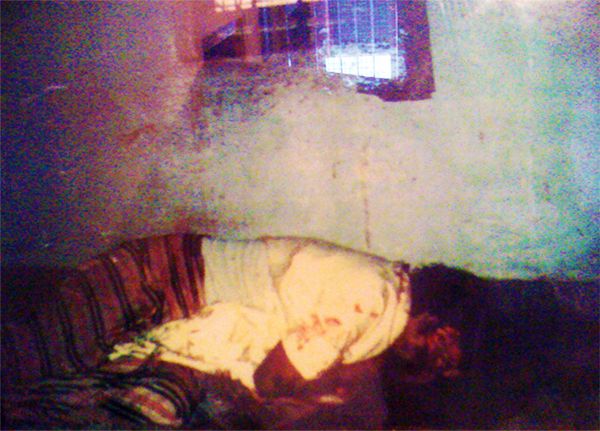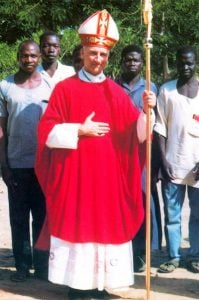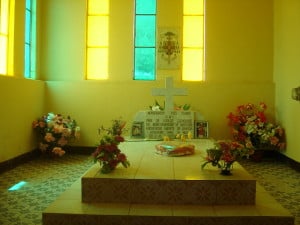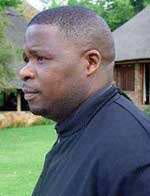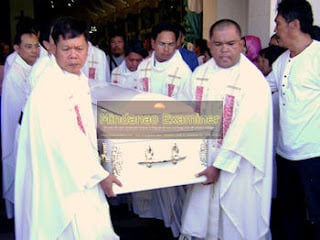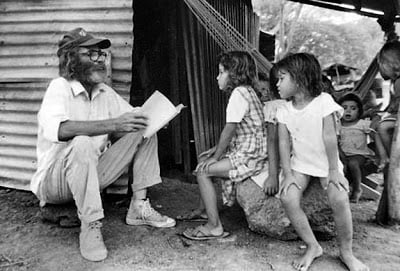They gave an Extraordinary Oblate Witness
January 10, 1831
Fr. Joseph Théodore Martial Capmas O.M.I. (1791-1831) had been a priest of Montpellier diocese and entered the Missionary Oblates of Mary Immaculate in 1828. Fr. Capmas had considerable success a popular missionary and preacher in France. Apart from his preaching, he took on the ministry of chaplain to the inflectious diseases hospital, the “Lazaret” in Marseilles. In late 1830 a serious epidemic of cholera broke out among soldiers. Realizing that the men dying in isolation in “Lazaret”, Fr. Capmas volunteered to go into quarantine with them. Fully aware of the great risk, he placed himself at the total disposition of the dying. He felt victim to the epidemic and died January 10, 1831. Fr. Joseph Hippolyte Guibert O.M.I. (1802-1873), the later Cardinal Archbishop of Paris, said: “I regard him as a true martyr of charity.”
 June 20, 1875
June 20, 1875
Bro. Alexis Reynard O.M.I. (1828-1875) from France, missionary in the Canadian North, got shot around June 20, 1875 near Rivière-des-Maisons, while protecting a girl against an Iroquois. Restored to an Indian custom parts of the victims body have been consumed by the aggressor.
April 2, 1885
Fr. Léon Fafard O.M.I. (1850-1885), Canadian and missionary in western Canada. He was the founder of Frog Lake mission.
Fr. Felix Marchand O.M.I. (1858-1885), born in France, was assigned to Frog Lake in 1885 to learn the Cree Language.
Both Oblates got involved in the Metis revolt on Holy Thursday, April 2, 1885. An armed group of Métis-people ordered all people to leave the Mission. On the track a government official refused to go any further and got shot. Fr. Fafard who turned to help the dying man got shot in the neck and died instantly. Fr. Marchand ran immediately towards Fr. Fafard and got shot in the forehead. 14 people had been killed in the Massacre of Frog Lake. The mission got burned down. The revolt lasted two month. – It might been interesting to know that two years later the Oblates converted the chiefs of the revolt to Christianity.
March 2, 1905
Fr. Franz Jäger O.M.I. (1875-1905), born in German and missionary in South-West-Africa, now Namibia at Aminus Mission. In 1904 the Hottentots fought against the Heroros and against the Germans who had colonized the country. The war-like situation around Aminuis had also its influence upon the Mission. On one of his long pastoral journey with the oxen cart Fr. Jäger got caught in an attack of Witbooi-Hottentots. It was at Mokokuan on March 2, 1905 in the afternoon. Fr. Jäger found himself surrounded by about 20 Hottentots, threatening him with their guns. Fr. Jäger got killed through five shots that hit him in the upper thigh, the lower body, the shoulder and the breast. The cart of the Mission was put on fire. The Hottentots took also the oxen with them. On March 5, 1905 German soldiers brought back the by wild animals torn-apart body of Fr. Jäger to Aminuis Mission.
October 30, 1913
Fr. Guillaume Le Roux O.M.I. (1885-1913), born in France, was a Missionary to the Inuit people in the Northwest Territories of Canada.
Fr. Jean-Baptist Rouvière O.M.I. (1881-1913), born in France, got assigned to Canada’s northwest in 1906.
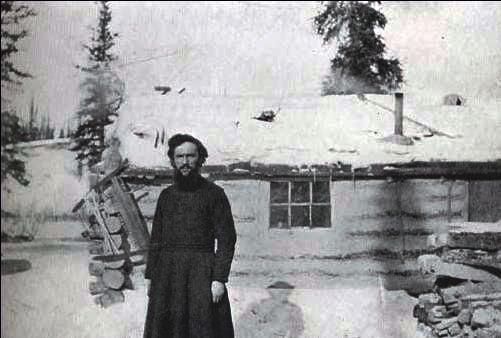
Jean-Baptist Rouvière O.M.I. (1881-1913)
In October 1913 both Oblates have been send out on dog sleds to move north to the Polar Sea. On their way they got attacked by two Eskimos. Their motive was robbery. Fr. Le Roux was stabbed in the back with a knife. Fr. Rouvière got shot in the small of the back. Both wounded Oblates than got killed: Fr. Le Roux was stabbed to death. Fr. Le Roux got killed with an axe. One of the robbers chopped of his head and his legs. After killing both, presumably October 30, 1913, the two men then cut them open to eat some of their entrails The two murders were tried, found guilty and condemned to death. But the Vicar Apostolic of Mackenzie, Mons. Gabriel Joseph Élie Breynat O.M.I. (1867-1954) appealed that their sentence be commuted to “a great act of piety and charity”.
September 12, 1939
Sc. Józef Gembiak O.M.I. (1914-1939) from Poland, entered the Oblates in 1936 and studied at the scholasticate at Krobia.
Sc. Józef Rogosz O.M.I. (1914-1939) from Poland, entered the Oblates in 1936 and studied at the scholasticate at Krobia.
Sc. Franciszek Munko O.M.I. (1916-1939) from Poland, entered the Oblates in 1936 and studied at the scholasticate at Krobia.
Sc. Franciszek Glados O.M.I. (1917-1939) from Poland, entered the Oblates in 1936 and studied at the scholasticate at Krobia.
The four scholastic brothers have been executed by the German army at Michalów on September 12, 1939.
December 18, 1939
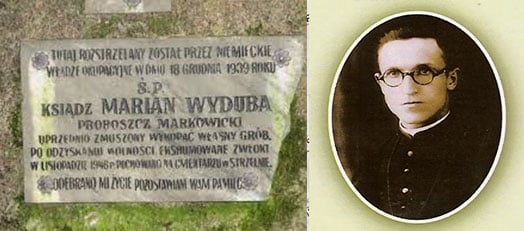
January 12, 1940
Sc. Henryk Trzaska O.M.I. (1912-1940), born in Poland hat entered the Oblate novitiate in 1930. He studied in the scholasticate communities at Krobia and Obra. In 1935 he felt mentally sick. He got hospitalized in Gniezno. There he got killed by Germans within the Nazi euthanasia program on January 12, 1940.
June 28, 1940
Fr. Jan Finc O.M.I. (1910-1940), born in Poland, was an Oblate priest since 1934. He was named superior of the Oblate house of Święty Krzyż. On April 3, 1930, the Gestapo arrived to investigate all the members of the community. Fr. Finc and three others have been taken to the prison camp at Kielce, accused of helping Polish partisans. Fr. Finc was never seen again. According to German official records, he was condemned by a war tribunal and shot on June 28, 1940 in Kielce.
September 10, 1940
Nov. Jan Szamocki O.M.I. (1919-1940), from Poland had stared his novitiate with the Oblates in September 1939. On May 4, 1940 he was taken to Szczglin prison, and then moved to Germany the concentration camp of Dachau, before being transferred to the Concentration camp of Gusen in Austria. There he died from maltreatment on September 10, 1940.
 January 22, 1941
January 22, 1941
Sc. Alfons Manka O.M.I. (1917-1941), born in Poland, finished his novitiate at Markowice in 1938. He continued his studies for the priesthood at the scholasticate in Krobia. On October 10, 1939 he was placed under house arrest and put into forced labour. On June 4, 1940, along with other scholastics and novices he was sent to the concentration camp at Szczeglin. He was later transferred to the concentration camps of Dachau / Germany and Gusen / Austria. It is reported that he died from utter exhaustion there, January 22, 1941
June 7, 1941
Fr. Ludwik Kasalka O.M.I. (1914-1941) from Poland joinde the Obaltes in 1932 and was ordained a priest in 1938. He got assigned to the Oblate house in Poznan. He got arrested in Zabikowo on January 27, 1940, and was sent to the concentration camp in Dachau / Germany. He felt sick in the camp and finally, on June 7, 194, he died of malnutrition.
August 21, 1941
Fr. Pawel Kulawy O.M.I. (1877-1941), of Polish origin, born in Lesnica / Poland (then Leschnitz / Germany), had entered the Oblates in the Netherlands in 1896. He had studied in the German scholasticate at Hünfeld and was ordained a priest in 1902. His elderly brother Jan Wilhelm Kulawy O.M.I. (1972-1941) was already an Oblate priest. Fr. Pawel Kulawy spent his first years of priesthood in western Canada, leaving there to become one of the founding members of the Oblate province of Poland. Since 1938 he worked in Święty Krzyż. In April 1940 the Germans requisitioned the Oblate house, and Fr. Kulawy was imprisoned at the notorious concentration camp at Auschwitz. He died there exhausted on August 21, 1941.
September 10, 1941
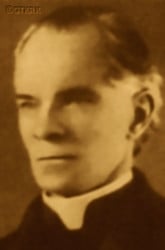
Jan Wilhelm Kulawy O.M,I.
Fr. Jan Wilhelm Kulawy O.M,I. (1872-1941), of Polish origin, born in Lesnica / Poland (then Leschnitz / Germany), entered the Oblates in the Netherlands in 1892. He was sent for his major priestly studies to the Oblate seminary in Ottawa / Canada. He was ordained a priest in 1898. Frst he was assigned to the Vicariate of St. Boniface in Canada. Then he surfed as chaplain for Polish workers in Germany. Like his younger brother, Fr. Pawel Kulawy O.M.I. (1877-1941), he became one of the founding members of the new Oblate province of Poland. In 1921 he became the superior of the Oblate juniorate in Krotoszyn. From 1924 to 1927 he toured Canada and U.S.A. raising funds for the Polish province. Back in Poland the preached parish missions. In 1936 he was sent to the sanctuary of Święty Krzyż. Despite his advanced age, he was arrested by the German secret service on July 10, 1941 and sent to the concentration camp of Auschwitz. He lasted only two months there and died of ill treatment on September 10, 1941
November 13, 1941
Fr. Jan Pawolek O.M.I. (1882-1941), of Polish origin, born in Stary Popielow / Poland (then Alt Poppelau / Germany) entered the Oblates in the Netherlands in 1901. He did his seminary studies with the German Oblates in Hünfeld. There he was ordained a priest in 1907. As a man of many talents he preached missions in Germany and Poland. Since 1922 he worked as missionary stationed in Poland at Krotoszyn, Katowice and Poznan. He was arrested for a first time by the German forces January 8, 1940. After his realize he worked in the Oblate house of Święty Krzyż. There he was arrested again July 16, 1941, and sent to the concentration camp of Auschwitz, where he died November 13, 1941 because of malnutrition.
December 9, 1941
Sc. Mieczyslaw Frala O.M.I. (1920-1941), born in Poland, had entered the Oblates 1937. During his studies for the priesthood he was put into forced labour on a German farm. In May 1940 he was sent to the concentration camp at Szczeglin. He was later transferred to the concentration camps of Dachau / Germany and Gusen / Austria. On December 9, 1941 he was gassed to death in a mobile gassing wagon.
April 22, 1942
Nov. Ludwik Janski O.M.I. (1918-1942) from Poland was still an Oblate novice at Markowize. With the whole community he was placed under house arrest and made to work on a farm. On May 4, 1940 he was sent to the concentration camp at Szczeglin. He was later transferred to the concentration camps of Dachau / Germany and Gusen / Austria. He was put to work there, but was killed with an injection of petrol on April 22, 1942.
May 1, 1942
Bro. Tomasz Kozierowski O.M.I. (1906-1942), born in Poland, entered the oblate novitiate in 1935 in the age of 30. His first appointment as an Oblate brother was the community of Krobia. He worked there as a cock. In mid-July 1940 he was arrested by the German sacred service in his hometown Woszolow. He was imprisoned at Jarocin and Poznan, and then sent to the concentration camp of Auschwitz. He died there on May 1, 1942 from the rigours prison life.
July 2, 1942
Fr. Paul Bernard Drone O.M.I. (1913-1942), born in Belleville / USA, entered the Oblates in 1933, was ordained a priest in 1939 and assigned to the OMI mission in the Philippines. He served as a missionary in Cebu, Cotabato and Glan.
Bro. Michael Braun O.M.I. (1914-1942), born in Jackson / USA, entered the Oblates in 1935 and was send to the Philippines in 1940. He worked with the youth and was in charge of Mazenod Hall in Cotabato. In 1941, due to the war, he was sent to the Oblate Mission in Glan.
Fr. Edward C. McMahon O.M.I. (1916-1942), born in Lowell / USA, entered the Oblates in 1934, was ordained a priest in 1938 and assigned to the OMI mission in the Philippines. He served as a missionary in Lagao, Marbel and Glan.
Mid 1942 as the Japanese Troupes where about to reach the region of Glan, the Oblates decided to leave the mission. They accepted an offer by American Navy man and tradesmen to join them on ship to Australia and left the mission. They wanted to get out, before the Japanese forces caught them. After the war it was reported that the group had been captured and killed. They had to dig their graves and then the Japanese beheaded them all. That was at July 2, 1943 on Morotay-Island / Indonesia, at 7.00 pm. All were buried in a common grave.
August 21, 1942
Nov. Karol Spałek O.M.I. (1921-1943), from Poland, entered the Oblate Novitiate in Marcowice in 1939. He was under house arrest since October 5, 1939 and was sent to the concentration camp of Szceglin on Mai 4, 1940. He was later transferred to the concentration camps of Dachau / Germany and Gusen / Austria. He accepted the offer to be freed under the condition to join the German Army on October 15, 1940. He was killed in war action at Rososzka, Belarus (than Russia) on August 21, 1942.
October 5, 1942
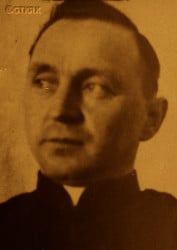
Czeslaw Bartosz O.M.I.
Fr. Czeslaw Bartosz O.M.I. (1909-1942), born in Poland, had entered the Obaltes in 1929. He was ordained a priest in 1934 and assigned to parish work. During the war, in 1942, because of the emergency conditions and the lack of ready medical supplies there was an outbreak of typhoid fever in the town of Stara Słupia. Despite the known risk Fr. Bartosz stayed in town and insisted on visiting the sick and bringing them the sacraments. Almost inevitably, he contacted the disease, and died on October 5, 1943
October 27, 1942
Nov. Józef Kubsz O.M.I. (1920-1942) from Poland entered the Oblates at Marcowice in 1939. He was under house arrest since October 5, 1939 and was sent to the concentration camp of Szceglin on Mai 4, 1940. He was later transferred to the concentration camps of Dachau / Germany and Gusen / Austria. He accepted the offer to be freed under the condition to join the German Army on November 22, 1940. He was killed in war action near El Alamein in Northern Africa on October 27, 1942.
December 29, 1942
Fr. Franciszek Kocot O.M.I. (1910-1942), born in Poland Polish, entered the Oblates in 1927 and was sent for studies to Rome. In 1934 he was ordained a priest in Poznan / Poland. He thought philosophy at the Oblate scholasticates in Obra and Krobia. He got arrested in October 1941 and sent to the concentration camp of Dachau in Germany. There, in November 1942, he was taken to be used as a guinea pig in “medical experiments” at the concentration camp of Auschwitz. The wounds and incisions made in the experiments were not allowed to heal because of the experiments and remained open. He suffered terrible agonies. Because of this horrendous barbarity, he died on December 29, 1942.
April 8, 1943
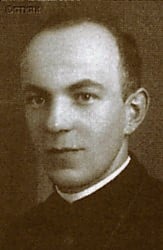
Antoni Leszczyk O.M.I.
Fr. Antoni Leszczyk O.M.I. (1908-1943), from Poland entered the Oblates in 1928 and was ordained a priest in 1934. He was assigned as a chaplain to the local prison in Święty Krzyż. When the war broke out he was sent as assistant priest to a neighboring parish. In 1943 he was arrested on the charge of “anti-German activity” and deported to the concentration camp of Majdanek. The only detail we know about his death is the date: April 8, 1943.
June 6, 1943
Fr. Józef Cal O.M.I. (1911-1943), born in Poland, entered the Oblates in 1929 and was sent for studies to Rome. In 1935 he was ordained a priest. He thought theology at the Oblate scholasticates in Obra. On January 27, 1940 he was arrested by German forces and taken various prisons and finally to the concentration camps of Dachau and Gusen. In Gusen he worked as slave labour in the rock quarries. In December 1943 he gat transferred back to Dachau. He died in Dachau after having contacted tuberculosis on June 7, 1943.
May 7, 1944
Bro. Antoni Adamski O.M.I. (1978-1944), was born in Poland. He entered the Obaltes in Germany in 1910 and served as cook in the German Oblate houses of Engelport, St. Nikolauskloster and Höntrop. Since 1920 he worked in different Oblate communities in Poland. In Lunin where he was stationed since 1938 he was forced on Mai 7, 1944 by the German Army to leave the house and the city. As he refused he was shot.
June 4, 1944
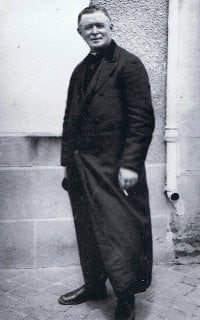
Francois Bousso O.M.I.
Fr. Francois Bousso O.M.I. (1881-1944), was born in France and was assigned to the Oblate missions in the Canadian Northwest. Out of health reasons he returned to France and became parish priest in the Diocese of Bayeaux. During the German occupation of France since 1940 Fr. Boucco presbytery became a haven for those refusing to be taken for forced labor squares. It also became a center for the clearing of messages among the French partisans. For Fr. Bousso the evil of German Nazism was not a political rather than a moral issue. He felt that he had to make a stand as a priest. German police found out about his activities. He was arrested. June 4, 1944 at Caen he was put to death by firing squad.
July 24, 1944
Fr. Christian Gilbert O.M.I. (1912-1944) was a Frenchman. After studies in Rome he was assigned as professor for moral theology to the teaching staff at the French Oblate Scholastikate LaBrosse-Montceaux.
Sc. Jean-Marie Cuny O.M.I. (1918-1944), from France had entered the Oblates in 1943. Before he had been a soldier in the French army. Since February 1944 he studied at the Oblate Scholastikate LaBrosse-Montceaux.
Sc. Lucien Perrier O.M.I. (1918-1944), French of origin, studied as well at the Oblate Scholastikate LaBrosse-Montceaux.
Fr. Albert Piat O.M.I. (1909-1944), from France, was professor for scripture at the LaBrosse-Montceaux seminary.
Bro. Joachim Nio O.M.I. (1898-1944), born in France, served as porter and cellarer in the seminary of LaBrosse-Montceaux.
At the outbreak of the war most Oblates in France have been convinced that resistance to the Nazi regime was a religious necessity, because of their anti-Christian principals. This deep religious conviction had moved Fr. Piat, the scholastics Cuny and Perrier and some other Oblates at LaBrosse-Montceaux to become involved in “La Compagnie Notre-Dame”, a cell of French underground, which drew people together un the patronage of Our Lady to resist the neopaganism of German National Socialism. Bro. Nio had not been involved in the movement. – In the morning of July 24, 1944 at 5.30 the German secret police forces (Gestapo) came to the seminary of LaBrosse-Montceaux. Fr. Gilbert activities in “La Compagnie Notre-Dame” had been betrayed by one of the partisans. Together with Sc. Cuny, Sc. Perrier, Fr. Piat und Bro. Nio he was taken to the basements room. The five Oblates were very cruelly beaten and tortured. Cuny, Perrier und Piat were constantly dunked in a tub of water till they almost drowned. Fr. Piats and Bro. Nios feed were burned with metal rods so that they could hardly walk. They then were led out in front of all the community members of the seminary and got shot one after the other because they refused to answer the questions of the Gestapo about hidden arms.
November 11, 1944
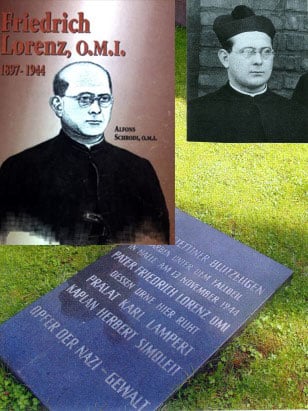
Friedrich Lorenz O.M.I.
Fr. Friedrich Lorenz O.M.I. (1897-1944), born in Hildesheim, Germany, became a novice of the Missionary Oblates of Mary Immaculate in August 1916. A month later ha was conscripted into the German army, fought on the western front and was wounded twice. He reentered the Oblates in 1919 and was ordained a priest 1924. For ten years he was part of the Oblate mission preaching band in Germany. In 1934 he was moved to the parish of Stettin in north-eastern Germany, now Poland. World War II. drew Fr. Lorenz back to the army, but as chaplain. In 1940 he was discharged from the army, as were all religious priests of officer rank. On his return to Stettin he found himself, perhaps at first innocently, involved in a group which was becoming more and more to realize and criticize, the growing injustices, crimes and atrocities of the Nazi regime. In February 1943 Fr. Lorenz, along with other 40 people, was arrested. He was endlessly interrogated and beaten. In December 1943 he was transferred to the prison of Halle and proceedings against him started. He was accused of lack of patriotism and of undermining the fighting spirit of German soldiers. Together with two other priests, Fr. Herbert Simoleit (1908-1944), a diocesan priest from Berlin and Mgr. Carl Lampert (1894-1944), the vicar general of Innsbruck, Fr. Lorenz was condemned to death on July 28, 1944. One of the lawyers said: “This is not a case of criminals. Their only tragedy is that they are Catholic priests.” The three priests died by the guillotine in the prison of Halle on November 13, 1944. One of them, Mgr. Lampert, was beatified by Pope Benedict XVI. December 13, 2011.
November 24, 1944
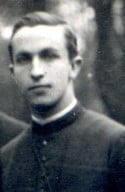
Justin Pennerath OMI
Fr. Justin Pennerath O.M.I. (1902-1944), French by origin, he served as chaplain to the novitiate-convent of the Sisters of All Saints at Lettenbach and assistant in the parish at Abreschwiller. In 1941 all catholic priests had been expelled from the diocese of Metz by the German Nazis. Fr. Pennerath was named pastor of Allanmont in the diocese of Saint-Dié. Some of his parishioners had been involved in the French Resistance. In late 1944 German Special Forces (SS) came to the presbytery. Fr. Pennerath refused to answer questions. He got beaten up and was taken to the prison camp of Schirmeck-Vorbruck. From there he was transferred to the concentration camp of Gaggenau / Germany. On November 24, 1944 Fr. Pennerath had to dig his own grave and was made to kneel down. He was shot in the neck in the head and fell into his grave.
October 24, 1956
Fr. Joseph Buliard O.M.I. (1914-1956) from France entered the Missionary Oblates of Mary Immaculate in 1934. After his ordination to priesthood in 1938 he got assigned to the Canadian mission territory of Hudson Bay. There he served in the Oblate missions of Repulse Bay, Black River, Baker Lake and Garry Lake. As missionary he traveled a lot by dogs slit, sometimes for weeks, to visit Inuit camps, ministering to the priest´s flock of newly converted Roman Catholics. He lived than in tents and Igloos. In winter 1939, temperature -35°C, he felt through the ice and severely froze his hands. Right from the beginning Fr. Buliard knew the difficulties and dangers of traveling in the Arctic. On October 24, 1956 Fr. Buliard took the decision to leave his mission only for some hours. He hitched his six dogs to the sled to get some fish out of the net. Shortly after he left a blizzard started. Wind picked up, snow reduced visibility. Fr. Buliard was never seen again. His disappearance remained mysterious. Until 1978 different rumours and theories came up that Fr. Buliard had been murdered. But most probably, that day in October 1956, because of the weather, the dogs went straight ahead, without taking the detour to avoid the undercurrent whish freezes only very late and Fr. Buliard drowned with his dogs sled.
January 22, 1964
In the Congo (then Zaire) in 1963 a group of young rebels, led by Muhele, were organized to overthrow the government. The acts of sabotage and distraction increased in the country. The Catholic Church was in danger of becoming a special target to some of the group influenced by communist principles. In early January 1964 there were increasing attacks on missions.
In January 22, 1964 tragedy struck the Oblate mission at Kilembe. About 11.00 pm over 50 armed rebels attacked the mission. A “Molotov cocktail” was thrown against the priests residence. The house caught fire. All the Oblates have been killed.
Fr. Gèrard Defever O.M.I. (1920-1964) from Belgium was the Superior of the mission. His body was found on a heap behind the house. He had deep slashes in his head, his arm and leg were hacked, one led crushed, his face and jaw smashed.
Fr. Nicolas Hardy O.M.I. (1919-1964) from Belgium taught at the mission school. His body was found under a raincoat. One hand was cut of, his legs speared.
Fr. Pierre Louis Laebens O.M.I. (1920-1964) from Belgium, was stationed in Idofa / Kongo and was just visiting the mission of Kilembe. His body was found horribly mutilated. His head has been smashed with an axe. He was covered in stab wounds, and his right arm had been chopped of and was mission.
July 1, 1966
Fr. Almanzar Ménard O.M.I. (1906-1966), Canadian born, entered the Oblate novitiate in 1929 and was ordained a priest in Ottawa in 1934. He was assigned to the mission field of Lesotho and arrived there in late 1935. His whole life was given to the Basuto people. During 31 years of missionary work served at seven different Oblate missions. On the morning of Friday, July 1, 1966, Fr. Ménard did not arrive at the normal time to celebrate mass for the Holy Family Sisters at Tsoeneng. One of the sisters went to the priest residence a St. Peter Claver. She found Fr. Ménard lying dead amidst a great splattering of blood around the house. He suffered 20 large stab wounds and gashes in his back, and his skull had been smashed in three places. The motive of a ritual murder was suspected. According to a custom, when a person feels lacking in power he kills someone who he regards as a worthy man. Part of the murdered persona, e.g. blood or parts of flesh, are taken and consumed. This is seen as a way to imbibe the spirit, or power, of the murdered person. When Fr. Menard´s body was examined there war found clear evidence that a large quantity of blood had been siphoned off from the body and was missing. Six men were arrested and found guilty of Fr. Ménard´s murder. But the motive of the murder has never established.
May 25, 1971
Fr. Renaud Bouffard O.M.I. (1931-1971), born in Augusta / USA, he entered the Missionary Obaltes of Mary Immaculate in 1955. He was ordained a priest in 1961 and sent to Haiti two years later. In 1968 he was named parish priest of St. Anne in Chardonnières, diocese of Les Cayes. Fr. Bouffard was on his way to establish a drinking water system. One Sunday, May 23, 1971 during the homily he announced to the parish that the funds for the project have been granted. Three man of his parish thought that Fr. Bouffard would have the money in his house. Fr. Bufford realized by night, that someone was trying to enter his room. But the thieves did not succeed that night. The next night the religious sisters from the Mission heard strange noises. Infect someone had tried to enter the room next to Fr. Bouffard´s office. The following night of May 25, 1971, two burglars entered Fr. Bouffard´s bedroom in the first floor by an open window. The third one was holding the ladder. One of them killed Fr. Bouffard in his bed with a machete. They only found a little pocket money of Fr. Bouffard.
November 3, 1971
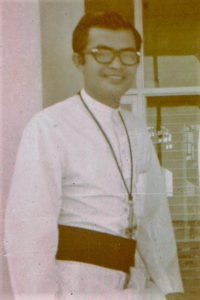
Nelson Javellana O.M.I. (1941-1971)
Fr. Nelson Javellana O.M.I. (1941-1971), born in the Philippines entered the Oblate Juniorate of Quenzo City in 1957, continued to the novitiate and was ordained a priest April 11, 1971. He started his ministry in the Archdiocese of Cotabato at Esperanza. At this time the continuing trouble between Moslem and Christian groups in the area had flared up again. Elections were due, and there was genuine worry, based on past experience, about irregularities in the election process. A group of Christian leaders of Esperanza, including Fr. Javellana was concerned about the justice of the elections. They prepared a petition to the chairman of the Commission on Elections seeking new procedures to ensure a just result. Fr. Javellana set out on November 3, 1971, with a busload of 12 people to meet the government officials at the airport. The chairman arrived on the 5.00 pm plane, and the group presented their petition. This done, they set out to return to Esperanza. On the way back the bus suddenly got attacked by an unidentified armed band. Taken by surprise they were sprayed with heavy automatic gunfire. Many, including Fr. Jevellana were killed instantly. The rest of the twelve people were attacked and hacked to death. The local authorities have never identified the murders. Fr. Jevellana had been a priest just short of seven months.
April 26, 1972
Fr. Rene Copet O.M.I. (1920-1972) On April 26, 1972, at South Padre Island, Texas, at the Gulf of Mexico a woman had a walk with her little child on a jetty. Out of a sudden she and the boy have been washed of by a strong wave. Fr. Copet witnessed the incident and jumped into the water in a rescue attempt. All three died in the floods.
May 26, 1974
Fr. Jean Franche O.M.I. (1907-1974), a Frenchman from Paris, entered the Oblates in 1927 and was ordained a priest in 1934. He got his first assignment to the North of Canada and served in different Oblate missions: Coppermine, Tuk, Inuvik. On May 24, 1974, at the Grand Hostel College of Inuvik, diocese of Mackenzie-Forth-Smith, he got shot by a native boy. The young man was drunk and had stolen the gun. There was no motive for the killing.
August 21, 1971
Fr. Maurice Lefèbvre O.M.I. (1922-1971) was born in Canada in 1922 and since 1953 a missionary in Bolivia. He was assigned there to work among those who mined silver in the mountains. Then he was sent to work among university students in the city. He was an intelligent man, and he taught his students not only about Christ but also that Christ loved them and did not want them to live under the oppressive military regime that then ruled Bolivia. In 1971 in La Paz there was a coup against the government. On August 21, 1971 Fr. Lafèbvre was supportive of the resistance of the coup and volunteered to drive into a zone of street battles to take out the wounded. He drove his van clearly marked as Red Cross, but as he wound through the streets he was fired on. Fr. Lefèbvre, on his mission of mercy, was not killed instantly. The troops surrounded the ambulance as he bled to death and permitted no one to come to rescue him. It took him three hours to die on the street, and he forgave those who had shot him before he finally died.
December 23, 1976
Fr. Raynald Beauregard O.M.I. (1931-1976) born in the Province of Quebec in Canada, he entered the Oblates in 1959 and was ordained a priest in 1965. He got assigned to the Province of Lesotho. There he worked as a missionary in the mountains in St. Leonard and St. Francis. Since 1970 he was stationed in St. Martin´s R.C. Mission. On December 22, 1976, at 9.00 pm Fr. Beauregard heard a knock at the outer door. Thinking the people outside were latecomers he opened the door and three men burst in. One man covered him with a revolver and the other two brandished knives. They demanded money, overpowered Fr. Beauregard and tied his hands and feet. Then they began the savage beating and stabbing. This ended only when they though him to be dead. Leaving Fr. Beauregard on the floor, they ransacked office and bedroom until they found little money. They departed after midnight. After Holy Family sisters had found the wounded victim and organized immediately to take Fr. Beauregard to the hospital in Roma / Lesotho. It took about 20 hours to arrive there. Shortly after his arrival at the hospital Fr. Beauregard died. Before he died, he said that he forgave those, his own parishioners, who had attacked and killed him. Until today it is not clear if the motive of murder was robbery. In fact, some of his new converts, his own parishioners who had not yet understood the new life given by Christ, killed Fr. Beauregard. They admired his great physical strength and thought they would share in it if they killed him.
November 10, 1987
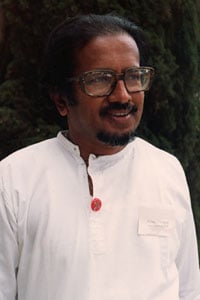
Bibliography: https://www.omiworld.org/wp-content/uploads/Bibliography-on-Fr.-Michael-Rodrigo.pdf
September 3, 1991,
Mons. Yves Plumey O.M.I. (1913-1991) was French born and entered the Missionary Oblates of Mary Immaculate in 1930. After World War II he was send as missionary to Cameroun-Chad. 1953 he was named Bishop of Garoua / Cameroun. In 1982 his diocese was divided in five new diocese. Mons. Plumey became the archbishop of Garoua. He retired in 1984 and became pastor of a parish in N´Gaoundéré. On September 3, 1991, just inside the door of the presbytery, the body of Mons. Plumey was found, bound, and bashed. A later autopsy showed that he had a heart attack as he was struggling to free himself from the ropes binding him. As little in the house was touched it appears that robbery was not the motive for the intrusion an attack.
February 4, 1997
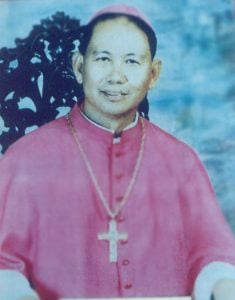
Mons. Benjamín de Jesús O.M.I.
Mons. Benjamín de Jesús O.M.I. (1940-1992), was Vicar Apostolic of Jolo. He was born July 25, 1940 in the Philippines. He entered the Congregation of the Missionary Oblate of Mary Immaculate in 1960. On December 29, 1967 he was ordained a priest. January 6, 1992 he was ordained bishop by St. John Paul II in Rome. Between 1972 and 1976, Jolo was the center of the Muslim Separatist Rebellion between the Muslim militants and the Filipino government. Radicals claimed to be fighting for an independent Islamic state. Many political and interreligious conflicts came. The Catholic Church got very much involved. Therefore the new bishop Benjamín de Jesús was exposed to dealing with top government officials of the province/municipality and military officials. In Sulu, Tawi-Tawi missions, Bishop Ben got used to riding on boats to visit the different islands to administer the sacraments or visit the school. He traveled a lot in the vicariate. Bishop Ben preached always of the same themes: Harmony. Understanding. Brotherhood. Peace. Love. His wisdom did not lie in his words but in his actions, in his simplicity and gentleness, with the way he would relate with the ordinary man and woman on the streets. He touched the lives of countless of people in Jolo by the simple gesture of goodness which he had consistently shown to people until his death. The bishop was shot dead by still unidentified armed Muslim extremist in front of the cathedral at February 4, 1997 around 9:45 in the morning.
Watch the video about Bishop Ben De Jesus, OMI, Fr Benjemain Inocencio,OMI, Fr Rey Roda,OMI
December 28, 2000
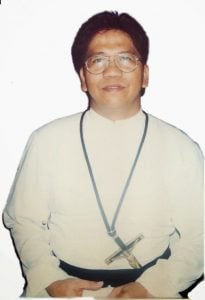
Benjamín Inocencio O.M.I. (1958-2000)
Benjamín Inocencio O.M.I. (1958-2000), was born in 1958. He entered the Congregation of the Missioanry Obaltes of Mary Immacuulate in 1986 and was ordained to the priesthood at Grace Park, Caloocan City, Metro Manila on April 25, 1992. He was first assigned to Timanan in June 1992. Three months later he was assigned to Cagayan de Mapun in Tawi-Tawi, where he became the Parochial Vicar of Mapun Parish and at the same time the Director of Notre Dame of Mapun. He spent more than eight years of humble and faithful service to the people of the island. In June 2000, he was assigned Chancellor of the Apostolic Vicariate of Jolo. At the same time, he served as Chaplain of the Notre Dame of Jolo College. Beside the Cathedral of Jolo, Fr. Inocencio was shot on the head that caused his sudden death on the feast of the Holy Innocents, December 28, 2000. The killer was a Muslim extremist.
May 17, 2001
Fr. Henryk Dejneka OMI (1950-2001), born in Poland, worked as missionary in Cameroon. He got shot in front of the presbytery of the Karna mission at Ngaoundérè / Cameroon on May 17, 2001. It is presumed that he was killed because of a baptism to a baby out of a Muslim family.
March 17, 2004
Fr. Robert Schwenker O.M.I. (1936-2004), born in the US, entered the Missionary Obaltes in 1963. He was ordained a priest in 1969. He worked in the US in parish ministry and as vocation director. Than he was send out as missionary to Puerto Rico (1981-1982), to Haiti (1983-1988), to the Dominican Republic (1988-1990) and to Mexico (1990-1992). In 1993 he arrived as a missionary in Colombia. Since 2000 he worked in the city of Bogota. In the early morning on March 16, 2004 he had been jogging, as it was his daily routine, in one of the poorer neighborhoods of Bogotá, where he lived. He was found unconscious by the side of a mountainous dirty road in an area where there are no inhabitants. At 8 am he was admitted to a clinic. He had suffered several severe blows on the back of his head. Fr. Schwenker died the following day, March 17, 2004. His murder was never found.
January 2, 2006
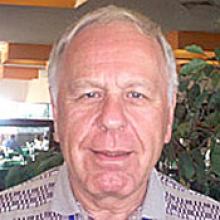
Louis Jolicoeur O.M.I.
Fr. Louis Jolicoeur O.M.I. (1938-2006), Canadian born, entered the Missionary Oblates in 1957. After studies in Rome he was ordained a priest in 1966. He served as missionary in Bolivia for more than 40 years, included parish ministry, formation at the Bolivian pre-novitiate, University professor, and treasurer then provincial of the Oblate Bolivian Province. In 1999 he was named President of the Institute of Theology. Fr. Jolicour was found murdered on January 2, 2006 in his private room. The circumstances of his death remained mysterious.
July 29, 2007
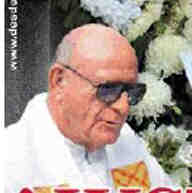
October 6, 2007
Fr. Allard Msheyene ´Mako O.M.I. (1965-2007) was born in Lesotho and joined the Oblates in South Africa in 1984. He did his scholasticate at Cedara and Rome / Italy. He was ordained a priest in 2003. Back in South Africa he got assigned to the novitiate at Misgund. He died at Nelspruit on October 6, 2007, of gunshots wound sustained during the course of a vehicle hijacking the previous day.
January 15, 2008
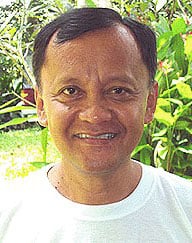
Jesus Reynaldo A. Roda O.M.I
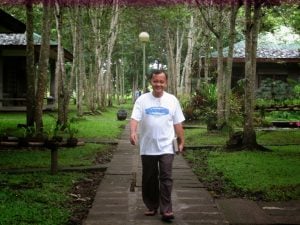
May 18, 2009
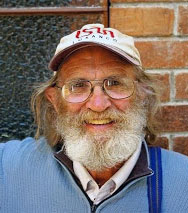
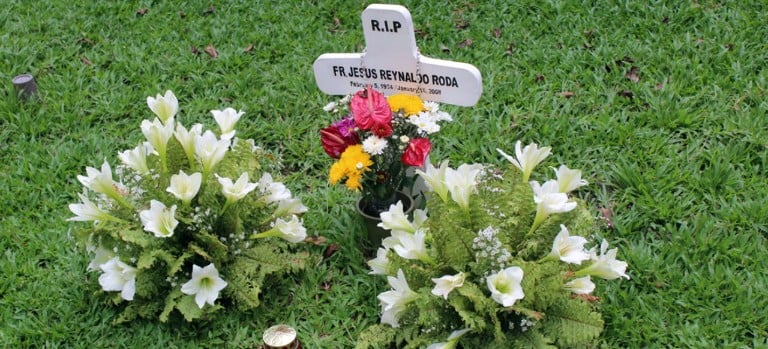
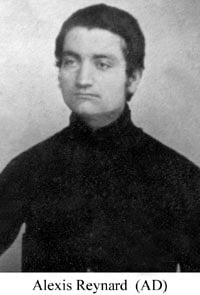 June 20, 1875
June 20, 1875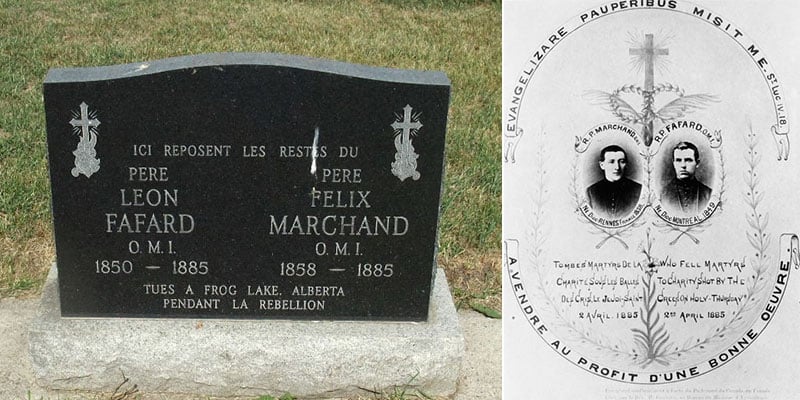
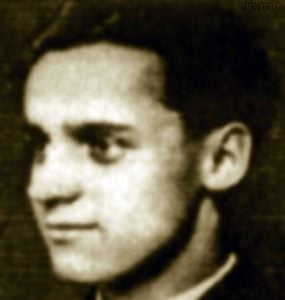 January 22, 1941
January 22, 1941